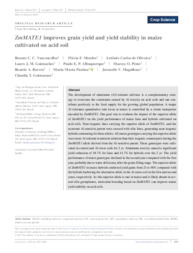ZmMATE1 improves grain yield and yield stability in maize cultivated on acid soil.
ZmMATE1 improves grain yield and yield stability in maize cultivated on acid soil.
Autoria: VASCONCELLOS, R. C. C.; MENDES, F. F.; OLIVEIRA, A. C. de; GUIMARAES, L. J. M.; ALBUQUERQUE, P. E. P. de; PINTO, M. de O.; BARROS, B. de A.; PASTINA, M. M.; MAGALHAES, J. V. de; GUIMARÃES, C. T.
Resumo: The development of Al-tolerant cultivars is a complementary strategy to overcome the constraints caused by aluminum (Al) toxicity on acid soils and can contribute positively to the food supply for the growing global population. A major Al tolerance QTL in maize is controlled by a citrate transporter encoded by ZmMATE1. Our goal was to evaluate the impact of the superior allele of ZmMATE1 on the yield performance of maize lines and hybrids cultivated on acid soils. Near-isogenic lines carrying the superior allele of ZmMATE1 and the recurrent Al-sensitive parent were crossed with elite lines, generating near-isogenic hybrids contrasting for these alleles. All maize genotypes carrying this superior allele were more Al tolerant in nutrient solution than their isogenic counterparts having the ZmMATE1 allele derived from the Al-sensitive parent. These genotypes were cultivated in control and Al stress soils for two years. Al toxicity caused a significant yield reduction of 18.7% for lines and 14.7% for hybrids over the two years. The yield performance of maize genotypes declined in the second year compared with the first year, probably due to water deficiency after the grain-filling stage. The superior allele of ZmMATE1 in maize hybrids conferred yield gains from 21 to 48% compared with the hybrids harboring the alternative allele in the Al stress soil in the first and second years, respectively. As this superior allele is rare in maize and is likely absent in several elite germplasms, molecular breeding based on ZmMATE1 can improve maize yield stability on acid soils.
Ano de publicação: 2021
Tipo de publicação: Artigo de periódico
Unidade: Embrapa Milho e Sorgo
Palavras-chave: Milho, Rendimento, Solo Ácido
Conteúdo relacionado
Observações
1 - Por padrão são exibidas publicações dos últimos 20 anos. Para encontrar publicações mais antigas, configure o filtro ano de publicação, colocando o ano a partir do qual você deseja encontrar publicações. O filtro está na coluna da esquerda na busca acima.
2 - Para ler algumas publicações da Embrapa (apenas as que estão em formato ePub), é necessário ter, no celular ou computador, um desses softwares gratuitos. Sistemas Android: Google Play Livros; IOS: iBooks; Windows e Linux: software Calibre.
Acesse outras publicações
Acesse a Base de Dados da Pesquisa Agropecuária (BDPA) para consultar o acervo completo das bibliotecas da Embrapa.

